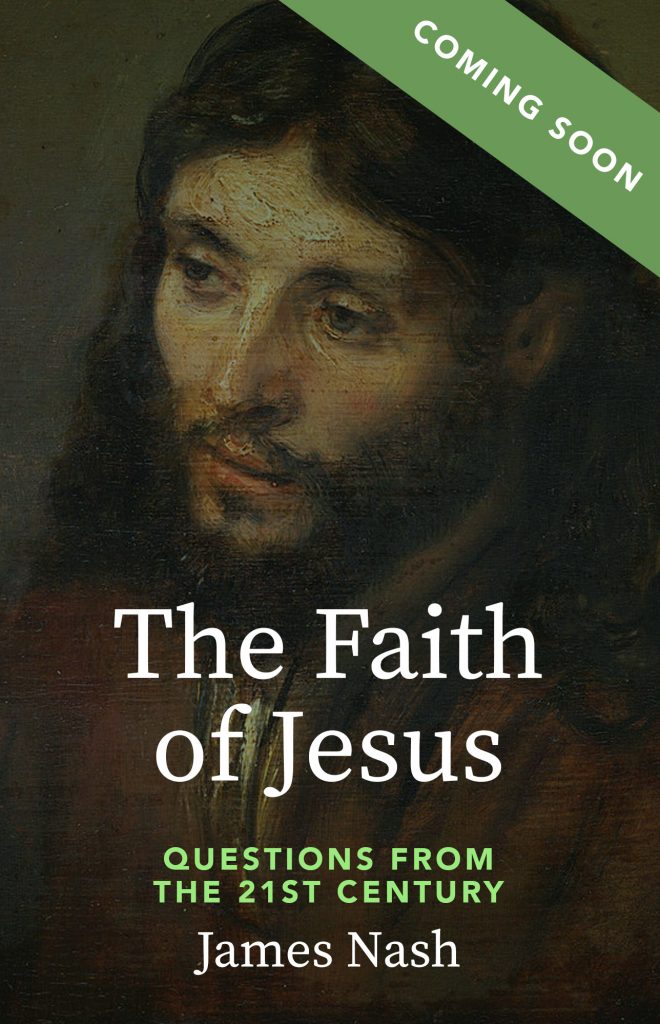First Sunday of Advent
Isaiah 2:1–5
Romans 13:11–14
Matthew 24:37–44
Author’s Note: Happy New Year! This is the first Sunday of Advent for Year A, the start of the new Church year and this is when my book begins. Today I am simply going to post verbatim the first chapter of my book so blog readers can have a taste of what they will find should they choose to buy it. It won’t be shipped for a couple more weeks, but you can order it now here: https://www.barnesandnoble.com/w/the-faith-of-jesus-james-nash/1142614673?ean=9781646638765

What does Jesus mean by “stay awake” or “watch”? Obviously, he cannot mean we should never go to sleep. The Greek word St. Matthew uses here is grēgoreĩte. It can be translated as “stay awake, alert, and vigilant,” or “to watch, to be awake.”[i] It also has a metaphorical connotation: to be alive.
We can read this as a warning. We need to be watchful to prepare for a danger we cannot now perceive: the thief in verse 43 who will come in the night when we least expect it. If we are watchful, we will not let our houses be broken into.
The connection between “to watch” and “to be ready” is confirmed in verse 44 when Matthew uses hetoimoi, which David Bentley Hart translates as “to be ready.”[ii] We are to stay and awake and vigilant, and to be ready for an unseen, unknown danger that will come at an unknown time. What is this danger?
One danger is that we “sleep-walk” through life, unaware of the spiritual possibilities—and temptations—that surround us. The biggest danger I fear is death and God’s judgment of me. Am I prepared for that? This is the time of year to think and pray about it as Jesus and the season of Advent ask us to prepare for this scary but unavoidable reality. Nature is dying all around us in the northern hemisphere. We know we will die, but like the thief in the night, we don’t know when it will come upon us. Because we don’t like to think about this unpleasant truth, it can be easy to forget about it.
The New Jerusalem Bible Commentary[iii] says watchfulness means “eschatological alertness to the will of God.” I like the idea of trying harder during Advent to be attuned to the will of God. What is distracting us? This time of year, in addition to all the parties and holiday “stuff,” we have the long nights of seasonal depression, self-pity that we aren’t as happy as we are “supposed” to be, thinking things should be a certain way when they are not, anxiety. For this reason, I embrace the secular substitution for “Christmas”: I use the word “holiday” to mean the commercial-cultural residue left over when the spiritual meaning of Christmas has been eliminated. Advent is inviting us to let go of all that junk so we can focus on preparing to meet the Savior of the world. What a relief!
How do we prepare for death and judgment? I think the last reading of this Church year, in which Jesus describes the Last Judgment, sheds light on this, the first reading.
We won’t get to it until the end of November next year, but in Matthew 25:31–46, Jesus describes the Last Judgment when the Son of Man returns in power and glory. In Matthew’s gospel this passage comes almost right after the one we read this week; both have to do with the end time. The Son of Man tells the sheep on his right hand, “Come, you who are blessed by my Father, inherit the kingdom prepared for you from the foundation of the world.” And what did the blessed do to deserve this joyous blessing? They clothed the naked, fed the hungry; they cared for the needy, and in doing so, Jesus tells them, they cared for him! The goats on his left hand did nothing for the poor, and they are promised a punishing future.
All too often, Advent is seen only as a time of preparation for Christmas. I learned from Thomas Merton that St. Bernard of Clairvaux believed this may keep us too focused on our current lives in the flesh. Bernard speaks of three Advents. The first is the birth of Jesus, the Savior of the world, which we celebrate at Christmas. The second is the presence of Christ in our lives right now, and one example of this would be that passage from Matthew 25:313–46: our recognition of Christ in the needs of the poor and meeting those needs now. The third Advent is when he comes again in power and glory to judge us and everyone at the end of time.
The three Advents are connected. I am suggesting we prepare for the third Advent of judgment by serving now the Jesus present in the needy. Clearing space and time in our souls so we are ready to meet the birth of Jesus at Christmas will make it easier to recognize the Christ already present inside of ourselves and others.
War on Christmas?

Staying alert and being prepared means watching for all three Advents. It also means paying attention to those habits of mind and body that distract us from them. Like “Christmas” parties. I put Christmas in quotes because these parties are usually celebrated during Advent and have little to do with Christmas.
We sometimes hear in the mainstream media about a supposed “war on Christmas.” I would say the war on Christmas was lost by Christmas long ago: the commercial takeover happened well before I was born. I do, however, believe there is currently a war on Advent! Advent is not a time for frivolity, presents, and drinking bouts. We have too much to watch out for. That said, it is a cold and dark time of year; our spirits do long for some fun as well. How to navigate this perilous and often depressing season?
One way for Christians to resist the commercial exploitation of Christmas while preserving its spiritual values is to keep watch all through Advent and then let go with some fun and frivolity during the twelve days when it really is Christmas. True, we will have to pass on some holiday parties. Recall that in our reading this week, Jesus points out that people were “eating and drinking” in the days just before the flood killed them. Declining the party invitations can be a respectful way to be a witness to our faith. We can say, “I’m sorry, but I don’t go out much during Advent. Let’s get together when it’s Christmas.”
I write this during the pandemic year of 2020. We are being told by the secular authorities to stay home and avoid all large gatherings. That is a beautiful message for Advent.
If we slow down and embrace the silent darkness to make time and space for Jesus during Advent, he will help to fill the emptiness we are tempted to fill with parties, presents, and all the other excesses of the commercial Christmas. I have a book for Advent with daily prayers and short readings from the Bible and Thomas Merton.[iv] I love it, but there are plenty of other books available. I also have a four-candle Advent holder, and I look forward every day to the moment when I turn off all the lights and light the candle(s) in my dark living room. Then I pray, read, sing, and play Advent hymns on my piano. Each week, we get to light another candle as we approach Christmas. Personal household rituals like this help fill the dark emptiness of the season, bringing a joy deeper than mere happiness. I now look forward to Advent.
One of the most depressing aspects of the secular “holiday season” for me is the obligation to feel a kind of mindless happiness. In fact, a sorrowfulness is built into our celebration of Christmas. We know that the baby whose birth we celebrate grew up to die a horrible, unjust death, tortured by the authorities, betrayed and abandoned by his friends, misunderstood by everyone.
The gospel that begins our church year has the same message as the one Jesus gave to his favorite three disciples near the end of his life when he was praying in agony at Gethsemane: watch! But they fell asleep on him. The candle I light does not eliminate the shadows; it sharpens them.
Many of us also have personal and emotional reasons for sadness this time of year. We might grieve anew for someone we loved who is no longer with us to celebrate the holidays. Is it just me, or does the Advent-Christmas season seem to invite us to tally up our many losses? Those of us who are old may recall with sadness the innocent joy bubbling inside us at Christmas as children. No matter our age, if we have some beautiful memories of past Christmases, we may mourn how distant that time now feels. It can be tempting to think that other people’s families are far happier than ours. If we are lonely, Christmas will heighten it. And it’s dark all the time.
For all these reasons, this time of year makes me so grateful for my faith in the Lord! God normally speaks to me, as he did to Elijah, in a “still small voice” (1 19:12). But it is as if God is now shouting at me, “This world is passing away! Focus on the eternal, you idiot!”
“Unless you become like children…”
Culturally, Christmas seems to be all about kids and our lost childhood, but more importantly, in a spiritual sense, Advent-Christmas invites us to become childlike. In Advent we prepare to celebrate the birth of a child. Jesus said, “Truly, I say to you, unless you turn and become like children, you will never enter the kingdom of God” (Mt 18:3).
What does it mean to be childlike? Jesus certainly meant we need to be humble, and that is a central motif of this season. The King of Kings is born as a little baby in a stable!
Another characteristic of children is that they are looking ahead with joyful anticipation rather than looking back in sorrow. Remember how as children we could not wait for Christmas to arrive? For an adult Christian, looking ahead means a joyful anticipation of meeting Jesus, whether at his second coming or when we die.
The first reading from Isaiah paints a beautiful picture of this future kingdom. I can’t wait to see swords beaten into plowshares! Won’t it be wonderful when wars are a thing of the past? It is easy to become depressed at the gap between the promises of the Christ we celebrate at Christmas and the sad reality of our fallen world.
However, we tend to be blind to the many ways our world is far, far better now than it was before Jesus was born, and blind also to the role the Holy Spirit of Jesus played in creating these improvements. To mention just a few advances: the status of women, children, slaves, and outcasts of all sorts, and the end of crucifixion and gladiatorial games where people paid to see wild beasts devour live human beings.
Still, we live in the “in-between time,” between the promise and its complete fulfillment. That can depress us, but if we are truly confident in the third Advent, that Jesus will come again in glory, we have so much to look forward to that we can be like children awaiting Christmas, striving to be worthy of the gifts promised us.
I am not saying this is easy or that it comes naturally. We need God’s help to feel it, to believe it, and to act on it. But this spiritual goal may be the greatest Christmas gift of all.
[i] In translating Greek I have used Walter Bauer, A Greek-English Lexicon of the New Testament (Chicago: University of Chicago Press, 1979) and Abbott-Smith’s Manual Greek Lexicon of the New Testament found at https://gntreader.com/?b=EPH&c=1&v=1 Abbott-Smith is abbreviated as AS; Bauer as B. I have also relied on David Bentley Hart’s fine translation of The New Testament, see note iii.
[ii] The New Testament, trans. David Bentley Hart (New Haven: Yale University Press, 2017), 50..
[iii] Raymond E. Brown, S.S., Joseph A. Fitzmyer, S.J., Roland E. Murphy, O. Carm., eds. The New Jerome Bible Commentary (Englewood Cliffs, N.J.: Prentice Hall, 1990) 668. Abbreviated as NJBC.
[iv] Thomas Merton, Advent and Christmas with Thomas Merton (Liguori, Missouri: Liguori, 1989).



The argument for restraint during Advent is a good one, given the excesses of materialism and bibulousness around the holidays, but aren’t we celebrating “the arrival of a notable person”? Any birth is cause for celebration–how much more the birth of a man who is God and the savior of all us sinners? Even though we know the tragedy that will befall Jesus, all children who are born will die, eventually, and some of them similarly tragic deaths. Christmas is a time to celebrate a glorious birth, not death and tragedy. This commentary from the First Week of Advent made me feel a bit guilty for the anticipatory joy I feel as the holidays approach.
My goal was not to provoke guilt, but to reduce stress, which many people complain of this time of year. I confess I celebrate Christmas a little bit during Advent. I put up a Christmas tree, eat Christmas cookies, and so on. I don’t want you or anyone to feel guilty about having fun during Advent or any time of year. I am trying to suggest, though, that it makes some sense to try to hold back a bit on some of the commercial frenzy of “Christmas”, make space in Advent for quiet contemplation, and save some fun for the days after Christmas. People can get so stressed out “preparing” for Christmas, when that means buying presents, cards, parties, meals, house decorations, and so on. But if you prepare for Christmas properly by slowing down and thinking about the mystery of the Incarnation, it is not stressful at all!
In your comments for the Third Week of Advent, you say that John died before the Kingdom arrived. “No prophet before John had been so close to the arrival of the Kingdom.” Does “the Kingdom” refer to the beginning of Christianity, i.e., the life of Christ? Christ was already here, and John baptized him, so John was still alive when Jesus was preaching and attracting followers.
I also have a question about the idea from Isaiah that “Jesus was fulfilling Isaiah’s prophesy for the restoration of Israel” [rather than coming as a ruler with political upheaval, like the messianic David). In what way did Jesus restore Israel? Israel itself didn’t change because of Jesus, unless what you mean is that Jesus brought a new message which changed the Hebrews by introducing a new morality.
Why do you refer to Jesus as the “Author of Beauty”? Is that a translation of something from the New Testament, or is it a name used by one of Jesus’s followers or a modern theologian? What does it mean?
These are three good questions. I will try to answer them later today.